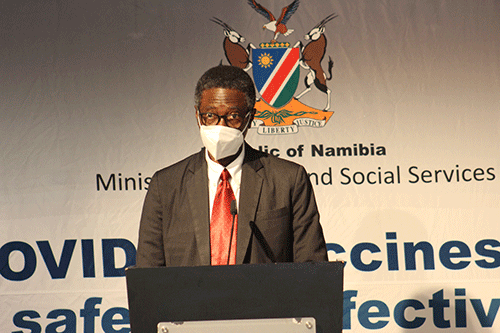Namibia needs to inoculate at least 10 000 people per day to reach the target of vaccinating approximately 60% of its population by December 2021, but falls far short of this number at the moment.
The World Health Organisation (WHO)’s representative to Namibia Dr Charles Sagoe-Moses said this on Friday at the official launch of the 'Get Vaccinated, Help Kick Covid-19 Out of Namibia', a comprehensive national campaign aimed at disseminating timely and accurate information, generate awareness and alleviate apprehensions and fears regarding Covid-19 vaccines.
The vaccination pace per day in Namibia steadily increased from 482 persons on 1 August to 1 915 citizens on 6 August 2021.
“Vaccination is the best weapon against Covid-19. We can do this as we have done with other vaccine-preventable diseases in the past,” he stated.
Namibia has up to 6 August fully vaccinated 52 681 citizens, which is 2.1% of the target, while 173 428 have at least received one dose of the Covid-19 vaccine. The vaccination programme kicked off on 19 March.
“A third of respondents from a recent WHO survey on adherence to Covid-19 public health measures were unwilling to be vaccinated because of safety concerns,” he observed.
The country’s vaccination programme came largely to a standstill in late June when both Sinopharm and AstraZeneca doses ran out in the midst of a deadly third wave of infections because of the late arrivals of procured vaccines.
By mid-July, 250 000 Sinopharm doses arrived, and yesterday 75 000 AstraZeneca doses arrived for those who have been waiting to get their second jab.
Yesterday, health minister Dr Kalumbi Shangula said “the vaccines have arrived this morning, and will be distributed to all the vaccination sites. Preference will be given to those waiting for the second dose, but nobody will be denied vaccination, even for the first dose.”
However, misinformation and conspiracy theories have hampered initiatives to get the masses vaccinated.
Sagoe-Moses said: “Vaccine hesitancy is an old phenomenon. In 2019, the WHO listed vaccine hesitancy as one of the 10 global public health threats. Delay and hesitancy to get vaccinated have caused many infections and deaths in the third wave.”
The overwhelming majority of Covid-19 deaths are of those not vaccinated.
Prime Minister Saara Kuugongelwa-Amadhila said at the same occasion that Namibia’s aim right now is to vaccinate 1 503 684 people, which is about 64% of the entire population, and Namibians need to be part of the campaign to kick the pandemic out of the country.
“This campaign is to motivate and provide information on the Covid-19 vaccines and vaccination process, generate awareness, assist in managing myths and misinformation, thereby helping in developing people’s trust and confidence to improve the acceptance and uptake of the vaccine,” she stated.
Kuugongelwa-Amadhila added that key stakeholders such as media professionals, traditional and religious leaders and influencers in communities should spread the message and assist in maintaining Covid-19 appropriate behaviours to reduce the risks of infection.
“We need to build capacity for our people to be able to differentiate between fake news and factual information for them to be able to make informed decisions,” she said.
More consignments of vaccines are expecting in the next few weeks and months to ensure enough stock for all eligible people.
Meanwhile, the Council of Churches in Namibia (CCN) urged “goverment to speak to us more regularly and with an open mind and agenda. Only as we share our experiences and offer to each other our particular gifts and strengths will we be able to serve our people to the best they deserve. Churches have already shown that they have the capacity to offer assistance in many ways, like acting as vaccination points, offering home-based care or developing some of its sites into wards for care.”
In a statement after a recent meeting, the CCN thanked those who “labour on our behalf to care for the sick, comfort the bereaved and risk their lives to save the lives of others. We applaud your efforts, and have committed ourselves to keep you in our prayers!”
They also encouraged Namibians and church members to support the vaccination campaign of the government.
“This support starts by having yourself vaccinated, and in so doing protecting others. We call on our people to listen to good and well-informed scientific advice rather than to misleading and harmful messages as ever so often expressed on social media platforms. Vaccination goes a long way to protect ourselves and others,” read the statement.
They furthermore called on government to respond to the devastating impact of the pandemic on jobs, livelihoods and the incomes of families and households.
“As church leaders, we call on our government to consider a relief intervention similar to the Emergency lncome Grant, but to provide this on a more permanent basis.”


